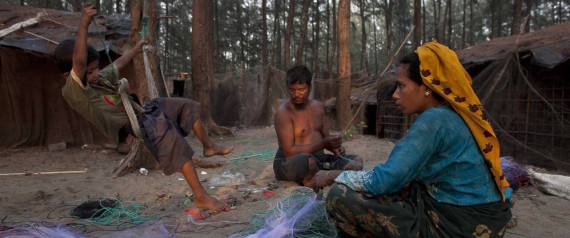Last week the London School of Economics hosted a conference on the Rohingya, with academics, legal experts and human rights advocates from all over the world attending. The United Nations Special Rapporteur on human rights in Burma also addressed the conference.

What might surprise some is the main subject which dominated the conference, whether genocide was about to happen, or whether it had already started. It is a sign of just how bad things have got since the latest waves of attacks began in 2012 that this is the issue now being discussed.
Legal experts, academics, and NGOs working in Burma identified key elements of genocide which are taking place there. These included denying Rohingya legal existence and right to nationality; access to medicine, food, and other basic necessities to sustain life; policies of extensive structures of discrimination, and allowing and facilitating hatred and popular violence against the Rohingya. Combined, these threaten to lead to the extermination of Rohingya as an ethnic group in Burma.
"The United Nations has taken 20 years to apologise for its failure to recognise and prevent the Rwandan genocide; the international community should not repeat the same mistake in Myanmar," Prudentienne Seward, a survivor of the genocide in Rwanda, told the conference.
Within Burma debate about the Rohingya is very different. Aung San Suu Kyi has dismissed without viewing it evidence complied by Human Rights Watch that ethnic cleansing of the Rohingya has taken place. The Rohingya are characterised as foreigners, and very few people are willing to support our human rights. You might have thought that even if many people in Burma are racist and want us out of the country, they would still be opposed to ethnic cleansing being committed against us, and would condemn our homes being burnt, women raped, and children killed. But there is no public outcry, no domestic pressure for human rights violations against us to end.
If violations against us are to end, it needs intervention from the international community, it won't come from within Burma. But with even the Special Rapporteur on Burma stating that the human rights violations against the Rohingya may be crimes against humanity, and still no response from the international community, it is questionable what will finally prompt action. This is why the discussions on genocide take on a special significance.
The situation for the Rohingya has been bad for decades, but it has got much worse sinceThein Sein became President. There are around a million Rohingya in Burma, and every one of them is living in fear for their lives.
As Rohingya we are used to suffering. I have friends who were jailed just for getting married without government permission. At least 500 Rohingya are in jail today for this reason.
We have long faced restrictions on movement, restrictions on access to healthcare, to education, extortion, beatings, people disappeared, arrest , arbitrary executions and occasionally, mass killings. The list of human rights violations and repressive laws and policies have been well documented. Life for us was already intolerable. Now it is even worse.
We are subject to a systematic campaign to force us out of Burma. It is a campaign that has support from the highest level of the government, the President himself. He has called for help from the UN to expel all Rohingya from Burma. Through his actions, and by inaction, he has supported and encouraged violence against us. And he strongly supports the laws and government policies which discriminate against us, and which the UN Special Rapporteur on Burma has said may constitute crimes against humanity.
The government of Burma uses six main methods against us:
• Laws which discriminate against us.
• Incitement and encouragement of hatred against us.
• To disenfranchise us from any political representation.
• To starve us by stopping economic activity and restricting humanitarian access.
• To use state violence against us.
• To encourage and allow non-state violence against us.
A new form of apartheid is being created to segregate us. To put us into camps or isolated villages where life will be so terrible people will be forced to leave the country.
All this is happening today in a country which the British government, the USA, and other countries describe as making great progress, where human rights are improving, and is making a transition to democracy.
Organisations such as Human Rights Watch and Fortify Rights have already documented human rights abuses which may constitute ethnic cleansing and crimes against humanity. The Special Rapporteur on Burma has also stated that there may be crimes against humanity against the Rohingya. No government has supported these statements, but they haven't publicly disagreed with them either. Privately the British government, the USA, the EU and others know what is being done to the Rohingya violates international law. But they have chosen not to act. They have even chosen to be silent about international law and the Rohingya.
If legal experts are now discussing whether genocide is happening, or in danger of happening, will this prompt the international community to act? Given that they have ignored ethnic cleansing and crimes against humanity, I am afraid this is a real possibility. I hope they will prove me wrong. I appeal to the world not to let another Rwanda repeat for Rohingya.
Tun Khin is President of the Burmese Rohingya Organisation UK.

No comments:
Post a Comment